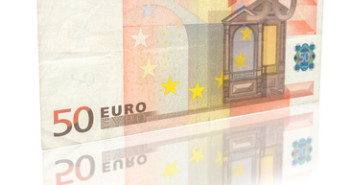EUR/USD put the brakes on this week’s slide after the US Federal Reserve policy meeting on Wednesday. Analysts were keenly attuned to the meeting, as it was the first since the Fed implemented QE3. The Fed expressed cautious optimism about the US economy, and, as expected, maintained its benchmark interest rate at 0%-0.25%. There is confusion in the markets after a draft agreement between Greece and the troika was leaked. If the reports about a deal are legitimate, we could see a rally by the euro. Today’s Euro-zone data was weak, including a disappointing M3 Money Supply reading. In the US, New Home Sales beat the estimate, and the markets will be watching to see if there is more good news from today’s key US releases – Core Durable Goods Orders, Unemployment Claims and Pending Home Sales.
Here’s an update about technical lines, fundamental indicators and sentiment regarding EUR/USD.
EUR/USD Technical
- Asian session: Euro/dollar edged higher, testing the 1.30 line. The pair is steady in the European session.
- Current range: 1.30 to 1.3060.
Further levels in both directions:Â Â 
- Below: 1.30, 1.2960, 1.29, 1.2814, 1.2750, 1.2670, 1.2624 and 1.2587.
- Above: 1.3060, 1.3105, 1.3170, 1.3290, 1.34, 1.3437 and 1.3480.
- The pair is testing the important 1.30 line. 1.3060 is the next line on the upside.
- 1.2960 is the next line of support.
Euro/dollar edges up after FOMC policy meeting– click on the graph to enlarge.
EUR/USD Fundamentals
- 8:00 Euro-zone M3 Money Supply. Exp. +3.0%. Actual +2.7%.
- 8:00 Euro-zone Private Loans. Exp.-0.4%. Actual -0.8%.
- 9:00 Italian Retail Sales. Exp. +0.3%. Actual 0.0%..
- 12:30Â US Core Durable Goods Orders. Exp. +0.8%.
- 12:30 US Unemployment Claims. Exp. 371K.
- 12:30 US Durable Goods Orders. Exp. +7.1%.
- 14:00 US Pending Home Sales. Exp. +2.3%.
- 14:30 US Natural Gas Storage. Exp. 66B.
EUR/USD Sentiment
- Fed says US Economy Showing Improvement: At its policy meeting, the first since QE3, there were no surprises. The Fed said that economy is improving slowly, but noted that job growth remains slow and high unemployment rate remains a concern. Operation Twist will continue until the end of 2012 and the QE3 continues at the pace of $40 billion per month. As expected, there was no change to the Federal Funds Rate of 0%-025%, and the Fed expects to maintain this level to 2015.
- Deal on Greek Debt?: The markets are abuzz over reports of a leaked draft agreement between Greece and the troika. According to the agreement, there would be an extension of two more years to reach a primary surplus, which would likely be 4.5% of Greece’s GDP. In return, Greece is to continue implementing structural reforms, including raising the retirement age from 65 to 67. The deal would allow Greece to receive the next installment of aid, in the amount of 31.5 billion euros. Talks between Greece and the troika have dragged on for months, so any news of a dramatic breakthrough should be taken with more than a grain of salt. If the media reports are indeed legitimate, we could see a strong rally by the euro.
- Weak German, Euro PMIs: The markets were hit with disappointing PMI numbers from Germany and the Euro-zone, indicating weakness in the manufacturing and services sectors. Adding to the bad news, the German Ifo Business Climate dropped to its lowest level since March 2010. The weak German numbers are likely to exacerbate market jitters over the health of the German economy, and with mounting financial problems at home, the German government will be less than enthusiastic about coughing up more funds for Greece and Spain.
- Spanish regions suffer downgrade: The Moody’s credit rating agency, which surprised the markets last week when it maintained Spain’s rating, brought down the gauntlet on Catalonia and four other regions – Andalucia, Castilla-La Mancha, Catalunya and Murcia. Moody’s cited poor liquidity and the huge debt problems that these regions are facing. The downgrade is another headache for the Spanish central government, and is sure to weigh on the euro.
- Election victory bolsters PM Rajoy: Spanish Prime Minister Mariano Rajoy received some much-needed good news on the weekend as his Popular Party won an absolute majority in the northeastern region of Galicia. In the Basque region, the PNV and Bildu, both staunch nationalist parties, were the winners. Madrid will no doubt spin the electoral victory in Galicia as a vote of confidence for the Spanish government’s austerity program. More importantly, the Spanish government may now feel that it can afford to delay a request for a relief package, and the saga over the Spanish bailout is likely to continue.
- New Bank Commissioner for Euro-zone? At last week’s EU Summit, Greece and Spain were barely mentioned. The leaders who attended focused on plans to move forward with the creation of a single European banking supervisory authority. However, the plan, which would represent an important step in European financial integration, is vague on key details, such as when the “super bank†commissioner will begin his/her work. Under the initiative, the Euro bank commissioner would be responsible for all 6,000 banks in the Euro-zone. ECB policymaker Joerg Asmussen has come out in favor of the idea, while German Finance Minister Wolfgang Schaeuble went a step further, stating that the EU needs a commissioner with power over member nations’ budgets.



